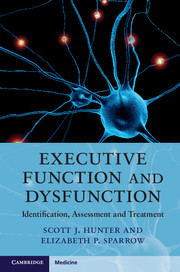Book contents
- Frontmatter
- Contents
- Editor biographies
- List of Contributors
- Preface
- Acknowledgments
- Introduction
- Section I Foundations of Executive Function/Dysfunction
- Section II Executive Dysfunction in the Neurodevelopmental and Acquired Disorders
- Introduction to Section II
- Chapter 5 Executive functions in disruptive behavior disorders
- Chapter 6 Executive functions in autism spectrum disorders
- Chapter 7 Executive functions in intellectual disability syndromes
- Chapter 8 Executive functions in pediatric movement and motor control disorders
- Chapter 9 Executive functions in learning disorders
- Chapter 10 Executive functions in mood and anxiety disorders
- Chapter 11 Executive functions in childhood epilepsy
- Chapter 12 Executive functions in pediatric cancer
- Chapter 13 Executive functions in HIV
- Chapter 14 Executive functions and neurotoxic exposure
- Chapter 15 Executive functions after congenital and prenatal insults
- Chapter 16 Executive functions in acquired brain injury
- Section III Applications
- Appendix 1 Abbreviations used in the book
- Appendix 2 Tests/tasks referenced in the book
- Index
- References
Chapter 13 - Executive functions in HIV
from Section II - Executive Dysfunction in the Neurodevelopmental and Acquired Disorders
Published online by Cambridge University Press: 05 October 2012
- Frontmatter
- Contents
- Editor biographies
- List of Contributors
- Preface
- Acknowledgments
- Introduction
- Section I Foundations of Executive Function/Dysfunction
- Section II Executive Dysfunction in the Neurodevelopmental and Acquired Disorders
- Introduction to Section II
- Chapter 5 Executive functions in disruptive behavior disorders
- Chapter 6 Executive functions in autism spectrum disorders
- Chapter 7 Executive functions in intellectual disability syndromes
- Chapter 8 Executive functions in pediatric movement and motor control disorders
- Chapter 9 Executive functions in learning disorders
- Chapter 10 Executive functions in mood and anxiety disorders
- Chapter 11 Executive functions in childhood epilepsy
- Chapter 12 Executive functions in pediatric cancer
- Chapter 13 Executive functions in HIV
- Chapter 14 Executive functions and neurotoxic exposure
- Chapter 15 Executive functions after congenital and prenatal insults
- Chapter 16 Executive functions in acquired brain injury
- Section III Applications
- Appendix 1 Abbreviations used in the book
- Appendix 2 Tests/tasks referenced in the book
- Index
- References
Summary
Most of the literature on infectious disease and the CNS has focused on broader aspects of cognitive and behavioral functioning with less emphasis on EF. However, the role of EF in mediating some behavioral and functional outcomes, as well as recognition of the potential for infectious diseases to strike at various points during the protracted development of brain regions subserving EF, has increased interest in this area.
Infectious diseases vary in their actions on the CNS, including direct attacks and secondary effects such as encephalitis (irritation and inflammation of the brain), meningitis (inflammation of the protective membranes covering the brain and spinal cord), or encephalomyelitis (a.k.a. myeloencephalitis; inflammation of the brain and meninges). Acute disseminated encephalomyelitis (ADEM) can occur following infection, and is associated with damage to white matter.
Infectious disease impacting the CNS can be bacterial in nature, including Bartonella henselae (a.k.a. “cat scratch disease”), the Borrelia family (causing Lyme disease), and Mycobacterium tuberculosis (TB). Viral causes of CNS inflammation in pediatric populations include the herpes viruses (including herpes simplex, Epstein–Barr, and varicellazoster), cytomegalovirus (CMV), mosquito- and tick-borne viruses, and enteroviruses (e.g., poliovirus, echovirus, coxsackievirus). Although measles, mumps, rabies, rubella, streptococcus pneumonia, and haemophilus influenza type B were cause for concern in the past, they are less prevalent now in the United States given the effectiveness of immunizations.
- Type
- Chapter
- Information
- Executive Function and DysfunctionIdentification, Assessment and Treatment, pp. 168 - 173Publisher: Cambridge University PressPrint publication year: 2012



